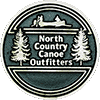It is whatever kind of outdoor experience you want it to be:
- A fishing trip
- A chance to experience solitude in God’s forest
- A chance for deeper bonding with a spouse or child
- A lengthy trip challenging the elements and your endurance.
- It can even be all of these things . . . in proportionate measure.
There is nothing that HAS TO BE DONE in a certain way. Canoe trips can be for:
- Any length of time
- Any distance
- Any degree of difficulty
- Tailored for almost any interest
Trips may start directly from our dock by just paddling away, riding out to a drop point by boat, or flying-off to Canada. Others start with a van ride to another entry point and paddling from there. Routes may return back to the starting point or to another pick-up location. Many work their way back to our lakeside base. This precludes having to set a pick-up time; rarely a problem, but certainly a consideration.
Travel patterns are left up to the individual parties pre-trip desires. One party may want to go out for 7 days, and have only one campsite. They plan to take day trips to various lakes each day, and return each afternoon to the same camp. Their sole reason for being on the trip is to catch walleye. A second party may want to be out 5 days, and be in a different campsite every night. In the morning, they will drop the tents, pack up, and head off to a new location. No one in this party is interested in fishing at all. A third party may want a 9 day trip, traveling every other day, having a layover on days #2, #4, #6, an #8. They want to do some fishing for smallmouth and northern pike, see some wildlife, swim below a waterfalls, and take a chance on staying up late to maybe see the northern lights. All of these trips have very valid goals, but they are totally different travel plans.
Most trips involve several portages (moving your gear and canoe from one lake to another) each day. Portages range from a few feet to a quarter mile; a “long portage” may extend up to a half mile. They take some effort to do as they are usually up or down hill to the next lake.
A travel day usually involves from four to six hours of paddling to get to your next campsite. For first time canoe trippers, we suggest having a few layovers. This allows for fishing and exploring without having to take-down and set-up camp. Greater distances can be covered as there is no gear to carry on portages. After a full day on the water, parties can then return to their camp, have dinner, watch the campfire and the stars, and turn-in.
Just like going to Europe where one can see 15 cities in 6 days or spend all 6 days in the Scottish Highlands, paddlers can try to do it all, or concentrate one specific area on a more relaxed pace. Of the two, we recommend a more relaxed schedule. After all, you can get a hectic pace while staying at home!
